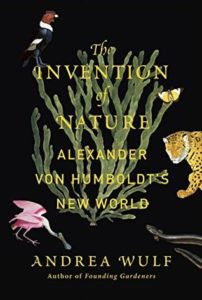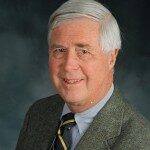 For those who attended this year’s Florence Griswold Museum-sponsored Samuel Thorne Memorial Lecture, which took place on Nov. 12, this month’s book review will ring significant bells. Not entirely by coincidence, we venture, our esteemed reviewer, Felix Kloman of Lyme, selected ‘The Invention of Nature’ as his book of choice this month and its author — Andrea Wulf — was the speaker at this year’s lecture .
For those who attended this year’s Florence Griswold Museum-sponsored Samuel Thorne Memorial Lecture, which took place on Nov. 12, this month’s book review will ring significant bells. Not entirely by coincidence, we venture, our esteemed reviewer, Felix Kloman of Lyme, selected ‘The Invention of Nature’ as his book of choice this month and its author — Andrea Wulf — was the speaker at this year’s lecture .
Who was Alexander von Humboldt, the subject of this engrossing new biography? I must admit I had only a fleeting memory of his name, but for many in the 1900s, he was acknowledged as a major icon of the previous century in science and philosophy. Humboldt was a well-born Prussian, and Wulf’s story of his life is one of an intensely curious man whose travels, meetings and writings influenced many of the key thinkers of those years.
Consider these names: Johan von Goethe, Friedrich Schiller, Simon Bolivar, Thomas Jefferson, Charles Darwin, John Muir, Henry David Thoreau, Ernest Haeckel, Joseph Banks, and George Perkins Marsh. This biography is an exultation of interconnections!
And connectivity was the theme of Humboldt’s life: “Everything seemed somehow connected – an (early) idea that would come to shape his thinking about the natural world for the rest of his life.” Nature, to him, was a “web of life and a global force … with plants and animals dependent on each other.” This “urge to understand nature, globally, as a network of forces and interrelationships” generated “ferocious activity” for his entire life.
It began with his remarkable initial expedition to South America, including a climb to the top of Chimborazo, an inactive volcano in what is now Ecuador, a search for a link to the Amazon River, then walking in Mexico and Cuba, and, finally, a visit to President Thomas Jefferson in Washington. As a note on those times, it took Humboldt and his fellow traveler three and a half days to move from Philadelphia to the capital city.
While he yearned to travel again to South America, and then to Asia, and Africa, his shortage of funds allowed him only one other extensive tour, from Prussia to Russia and its border with China. But he never lost his curiosity, even while writing his journals, publishing a later masterpiece of his thinking, Cosmos, and forever trading correspondence and ideas with everyone he had met.
Wulf writes “comparison not discovery was his guiding theme,” and Humboldt issued an early warning of three ways in which the human species adversely affected the climate, based on his travels: deforestation, “ruthless irrigation,” and the “great masses of steam and gas produced in the industrial countries.” Almost two centuries later, we still have not learned …
Charles Darwin and Humboldt had frequent communication, in person and through letters. They shared, according to the author, a “flexibility perspective … telescopic and microscopic, sweepingly panoramic and down to the cellular levels, and moving in times from the distant geological past to the future economy of native populations.”
Humboldt was an outspoken critic of colonialism and slavery, but he had to be cautious as he remained under the financial support of Prussian royalty. Those years featured the turmoil of revolutions, as Europe and the Americas shifted from absolute despotisms to emerging democracies, and often back again.
Wulf’s entrancing biography is reading history through the vision of one extraordinary man who saw “harmony in diversity.” Would that we had listened more closely to his words …
Editor’s Note: ‘The Invention of Nature’ by Andrea Wulf is published by Alfred A. Knopf, New York 2015
 About the Author: Felix Kloman is a sailor, rower, husband, father, grandfather, retired management consultant and, above all, a curious reader and writer. He’s explored how we as human beings and organizations respond to ever-present uncertainty in two books, ‘Mumpsimus Revisited’ (2005) and ‘The Fantods of Risk’ (2008). A 20-year resident of Lyme, he now writes book reviews, mostly of non-fiction that explores our minds, our behavior, our politics and our history. But he does throw in a novel here and there. For more than 50 years, he’s put together the 17 syllables that comprise haiku, the traditional Japanese poetry, and now serves as the self-appointed “poet laureate” of Ashlawn Farms Coffee. His wife, Ann, is also a writer, but of mystery novels, all of which begin in a bubbling village in midcoast Maine, strangely reminiscent of the town she and her husband visit every summer.
About the Author: Felix Kloman is a sailor, rower, husband, father, grandfather, retired management consultant and, above all, a curious reader and writer. He’s explored how we as human beings and organizations respond to ever-present uncertainty in two books, ‘Mumpsimus Revisited’ (2005) and ‘The Fantods of Risk’ (2008). A 20-year resident of Lyme, he now writes book reviews, mostly of non-fiction that explores our minds, our behavior, our politics and our history. But he does throw in a novel here and there. For more than 50 years, he’s put together the 17 syllables that comprise haiku, the traditional Japanese poetry, and now serves as the self-appointed “poet laureate” of Ashlawn Farms Coffee. His wife, Ann, is also a writer, but of mystery novels, all of which begin in a bubbling village in midcoast Maine, strangely reminiscent of the town she and her husband visit every summer.